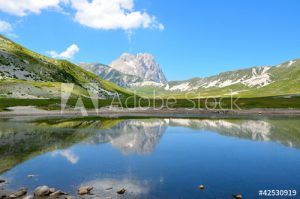When I was a little kid growing up in Ohio, I loved trains. I especially loved freight trains, with their multi-colored cars adorned with different logos. I remember learning, at some point, about trains in Europe. To my dismay, they looked completely different. In function, they were like the trains I knew, but they were smaller and shorter, the cars somehow lower and more elongated. When I actually went to Europe for the first time – to Italy – I was a young teenager. Driving away from Fiumicino airport, I happened to see an Italian freight train in the rolling countryside. I remember noticing that it had that stubby look that I disliked as a kid. The trip itself was wonderful, and I saw many beautiful places. I remember particularly the breathtaking, rugged beauty of the mountains in Abruzzo, where friends’ of my parents had a summer house.

I may never appreciate the aesthetics of Italian freight trains, but I still remember the beauty of the mountains in Abruzzo. It’s striking to me how my liking or disliking of something from the wide world of things made by people is dependent on so many factors – familiarity, aesthetic taste, romantic ideas. Nature is beautiful everywhere. Even when its beauty is surprising or alien, it feels somehow familiar. That freight train felt like it belonged to a foreign country called Italy. Those brooding mountains are a treasure that happened to be found there.

Familiarity, an appreciation for its particular charms – the natural world is our shared global home. It’s a large and varied home, but a singular one non the less. I’m trying to keep this in mind right now, especially as I embark on an environmentally themed piece for piano and dancer for Habitat: Home. Thinking of my myself first and foremost as a being at home in nature, on planet Earth – rather than in America, or with a particular group – is a significant shift of perspective. Perhaps the massive scale of the global climate challenges we face today will make us rethink our identities. We may need to see ourselves as residents of the natural world first, and citizens of countries or members of groups secondarily.
